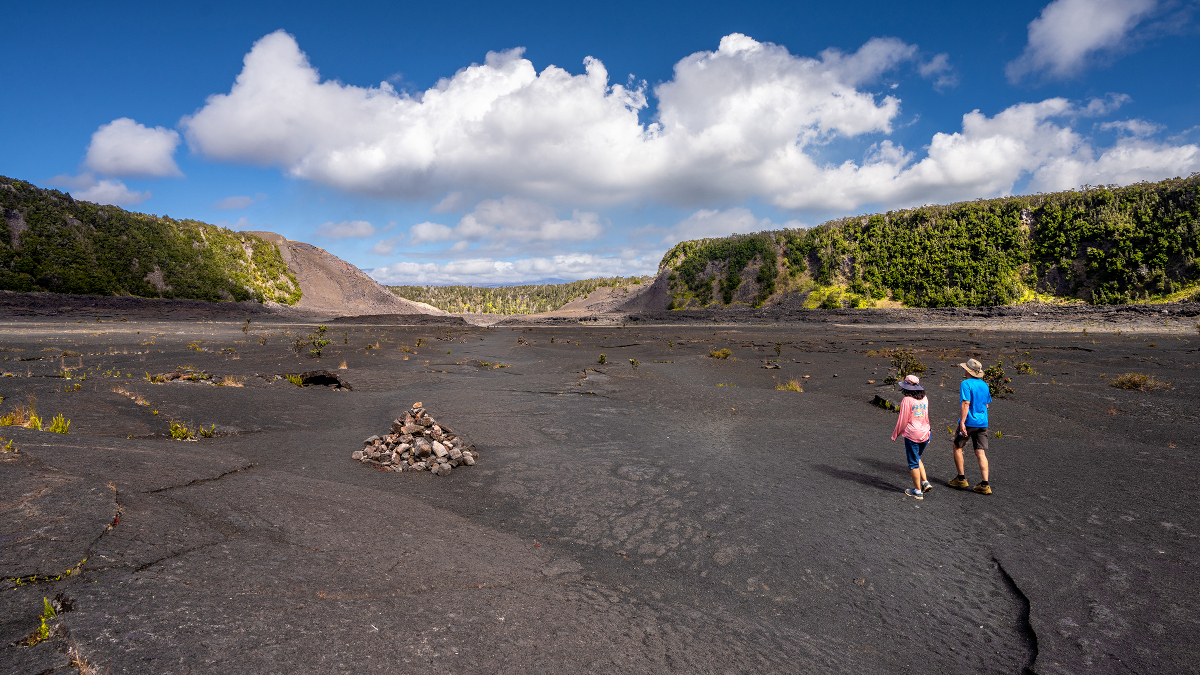(BIVN) – There will be a drastic reduction in the number of air tours flying over Hawaiʻi Volcanoes National Park, according to a newly completed Air Tour Management Plan.
After years of discussion and delay, the National Park Service and the Federal Aviation Administration completed the ATMP on December 20, 2023.
“The ATMP is more than 20 years in the making. It significantly reduces the number of low-flying air tours over the park to protect the natural and cultural resources, the wilderness character and general visitor experience,” said Hawaiʻi Volcanoes National Park Superintendent Rhonda Loh. “We deeply appreciate everyone’s input throughout this long process with us.”
Air tours over the National Park will continue under the ATMP, but at the reduced levels of 1,548 air tours per year, compared to the more than 11,300 annual flights currently allowed. Flights will also be reduced within a half-mile of the HVNP boundary “to protect natural and cultural resources, wilderness, the integrity of Native Hawaiian sacred sites and ceremonial areas, and visitor experiences.”
The ATMP also requires no-fly days every Sunday, and on certain traditional Hawaiian holidays.
Within the next 180 days, until the time the Operation Specifications are amended, “operators will be permitted to continue to conduct air tours within the Air Tour Management Plan boundary up to the limit of Interim Operating Authority”, the National Park Service says.
Specifically, the National Park Service says the plan:
- Authorizes up to 1,548 air tours per year on three specific routes within the plan’s boundary. This is a significant reduction from existing levels of more than 11,300 flights per year.
- The air tours can occur between 10 a.m. and 2 p.m. local time on Mondays, Tuesdays, Thursdays, and Fridays. Qualifying air tours using quiet technology may fly from 9 a.m. to 5 p.m. on those days, as well as on Wednesdays.
- Designates three air tour routes that avoid the summit of Kīlauea and protect key cultural and natural resources, visitor use areas, and park wilderness. Air tours will be limited to these routes.
- No-fly days on Sundays,
- No-fly days during six traditional Hawaiian holidays: End of Makahiki (typically in January), Zenith Noon (typically in May), Summer Solstice (June), Zenith Noon (typically in July), Start of Makahiki (typically in October) and Winter Solstice (December)
- No-fly days on two dates that honor and acknowledge important Hawai‘i Island aliʻi, people of traditional nobility: Ruth Ke‘elikōlani (February 9), and Bernice Pauahi Bishop (December 19)
According to the National Park Service:
The air tour management plan was developed in cooperation with stakeholders representing a variety of interests, including Native Hawaiian organizations, other land management agencies, local communities, and recreation groups. The plan addresses and responds to concerns identified during these consultations and through public comment.
Hawaiʻi Volcanoes National Park is one of several national parks for which the NPS and FAA have developed or are currently developing an air tour management plan or voluntary agreement to meet the requirements of the National Parks Air Tour Management Act. Each air tour management plan or agreement is developed to manage commercial air tours in a way that is consistent with the NPS’s mission, the individual park’s purposes, and the FAA’s authority to regarding aviation safety.
The final air tour management plan is available on the Planning, Environment, and Public Comment (PEPC) website here. Please visit NPS Air Tours and FAA’s Air Tour Management Plan site for more information about air tour management plans.


by Big Island Video News5:28 pm
on at
STORY SUMMARY
HAWAIʻI VOLCANOES NATIONAL PARK - The National Park Service and the FAA have completed the long-awaited Air Tour Management Plan for the park.